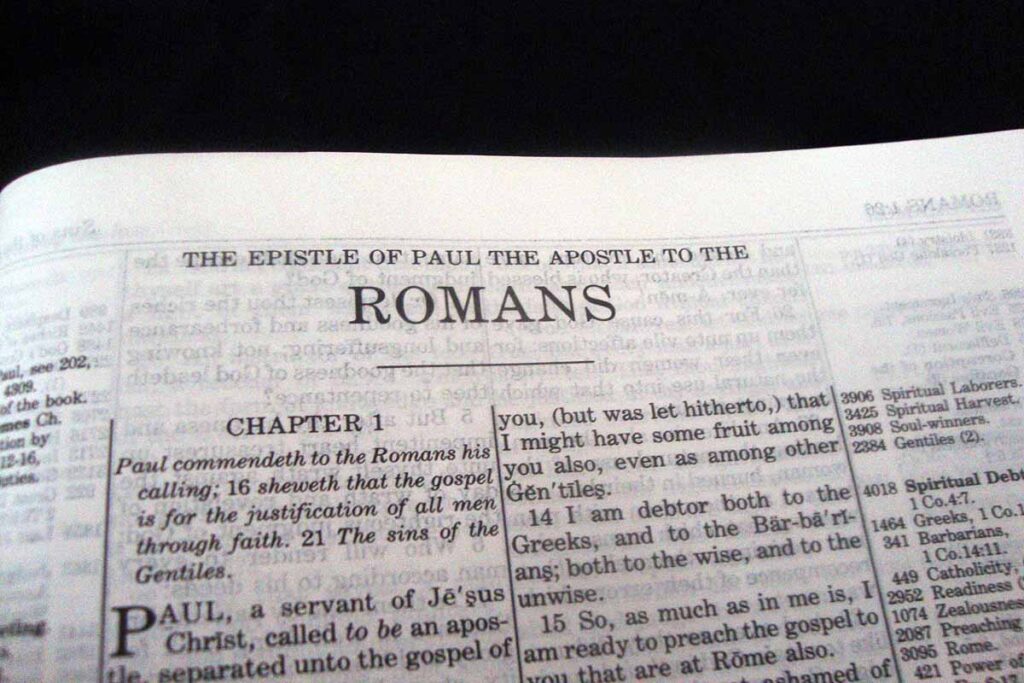In the book of Romans, the apostle Paul clearly sets forth the foundations of Christian faith. All people are sinful; Christ died to forgive sin; we are made right with God through faith; this begins a new life with a new relationship with God. Like a sports team that constantly reviews the basics, we will be greatly helped in our faith by keeping close to these foundations. If we study Romans carefully, we will never be at a loss to know what we believe.
Paul gives clear, practical guidelines for the believers in Rome. The Christian life is not abstract theology unconnected with life, but it has practical implications that will affect how we choose to behave each day. It is not enough merely to know the gospel; we must let it transform our lives and let God impact every aspect of our lives.
Romans was the last Acts period book written by the apostle Paul before the great dispensational change at Acts 28:28.
Writer of Romans
There can be no doubt that the book of Romans is an exposition of the content of the gospel by the strongest thinker is the early church – the apostle Paul. The book of Romans was written by the apostle Paul, “a servant of Jesus Christ” (Romans 1:1). Paul most likely wrote the epistle during his third missionary journey in the spring of A.D. 56 or 57, as he finalized plans to visit Rome.
To Whom Written
To “all that be in Rome, beloved of God,” (Romans 1:7), about three years prior to his arrival there, in contrast to all of Paul’s other Acts period epistles which were written after his respective visits. Of the 5,500,000 dispersed ancestral Jews (descendants of those in the Assyrian and Babylonian captivities), 100,000 of these “other sheep” were living in Rome as “far off ones.” This letter was addressed to them, and the recognition of this fact is essential to rightly dividing the content of this letter according to the charismatic administration (dispensation) of God during the Acts period. Paul was the God-commissions herald to these ancestral Jews and the Gentiles among them who had aligned themselves with Israel in hope of sharing the Jew’s blessings. Upon arriving in Rome, Paul waited three days before calling for the foremost Jews to set an appointed day for his address to them (Acts 28:17). After Subsequently presenting the gospel to them, he made the pronouncement recorded in Acts 28:28.
Purpose of Romans
The purpose of the book of Romans was to prepare those in Rome for the gospel (right message) that Paul was about to proclaim to them. He was to be the mediator, imparting some special spiritual gift to them, in keeping with the Acts period, prior to his declaration in I Timothy 2:5. Paul reiterated the advantages that belonged to the Jews at that time, as he declared in Pisidian Antioch (Acts 13:46), yet he prefaced his gospel by citing the condemnation of the whole world, including the Israelites, who considered themselves more righteous than Gentiles. After demonstrating the necessity of it, he then presented the idea of justification through Christ Jesus. He argued for justification by grace, apart from works. He showed that this justification had come by one Man – Jesus Christ. He then answered some arguments that the Romans may have heard against his gospel. He was not saying that since they were saved by grace, they should freely sin so that grace might abound. He refuted the charge that he was characterizing the law as sin. He demonstrated the true freedom of those who had entered into God’s love by means of his gospel. He also answered the charge that he did not care about those in the land of Israel, explaining what his true teaching was regarding them. He displayed God’s righteousness in choosing Israel to receive his gospel of salvation first (initially to the Jews within the land through the twelve, and then to the dispersed ancestral Jews though Paul). He justified his Acts period proclamation to Gentiles among the Israelites for the purpose of provoking the Jews to Jealousy. Then, he set forth the worthy walk, beseeching believers to live in the light of the principles that he had declared. He answered those who were fearing their first visit from an apostle, reminding them that those who do good have a reason for such fear. He argued against those who lorded it over others who did not have as much faith as they had. Paul’s closing words regarded his future coming to them, personal greetings and salutations, and a final two-fold statement about his gospel, which had been kept a secret until revealed by God-commissioned heralds and which would be “hushed in eonian times,” when God’s kingdom comes to earth.
Historical Setting
The book of Romans was written to a church that Paul did not found and had not visited. He wrote the letter to give an account of his gospel in preparation for a personal visit. Paul wrote most probably from Corinth, where he was completing the collection of money from the Macedonian and Achaian Christians for the “poor saints” in Jerusalem.
Theological Contribution
The great theme of Romans is God’s power to save. The Romans understood power; when Paul wrote this epistle to the capital of the ancient world, Rome ruled supreme. The gospel, however, is nothing to be ashamed of in comparison; for it, too, is power – indeed the “power of God to salvation for everyone.”
Recommended Bible Study Resources
ESV Study Bible – Study Bibles give you a deeper understanding of God’s Word with tools for life application like commentary, maps, charts, concordance, and study notes. Search our popular translations- NIV, ESV, NKJV, KJV and more!
Believer’s Bible Commentary: Second Edition – A Bible commentary is a written, systematic series of explanations and interpretations of Scripture. Commentaries often analyze or expound on individual books of the Bible, chapter by chapter and verse by verse. Some commentary works provide analysis of the whole of Scripture.
The New Strong’s Expanded Exhaustive Concordance of the Bible – The best concordance for word study! This exclusive new edition of a legendary classic puts generations of biblical research at your fingertips. A valuable tool for pastors, teachers, and students of the Bible.
Vine’s Complete Expository Dictionary of Old and New Testament Words – This classic word study resource allows you to study the meaning of biblical words in the original languages without spending years learning Greek or Hebrew. A great resource for students, seasoned pastors, and anyone who enjoys biblical word studies–even if they have little to no formal training in Hebrew or Greek.
Halley’s Bible Handbook – The beloved and classic Bible companion has been thoroughly updated, while retaining its time-honored features and Dr. Halley’s highly personal style, to offer even greater clarity, insight, and usefulness.
Click here to view or print the complete Bible Outline on “Romans – Justified Through Faith“





